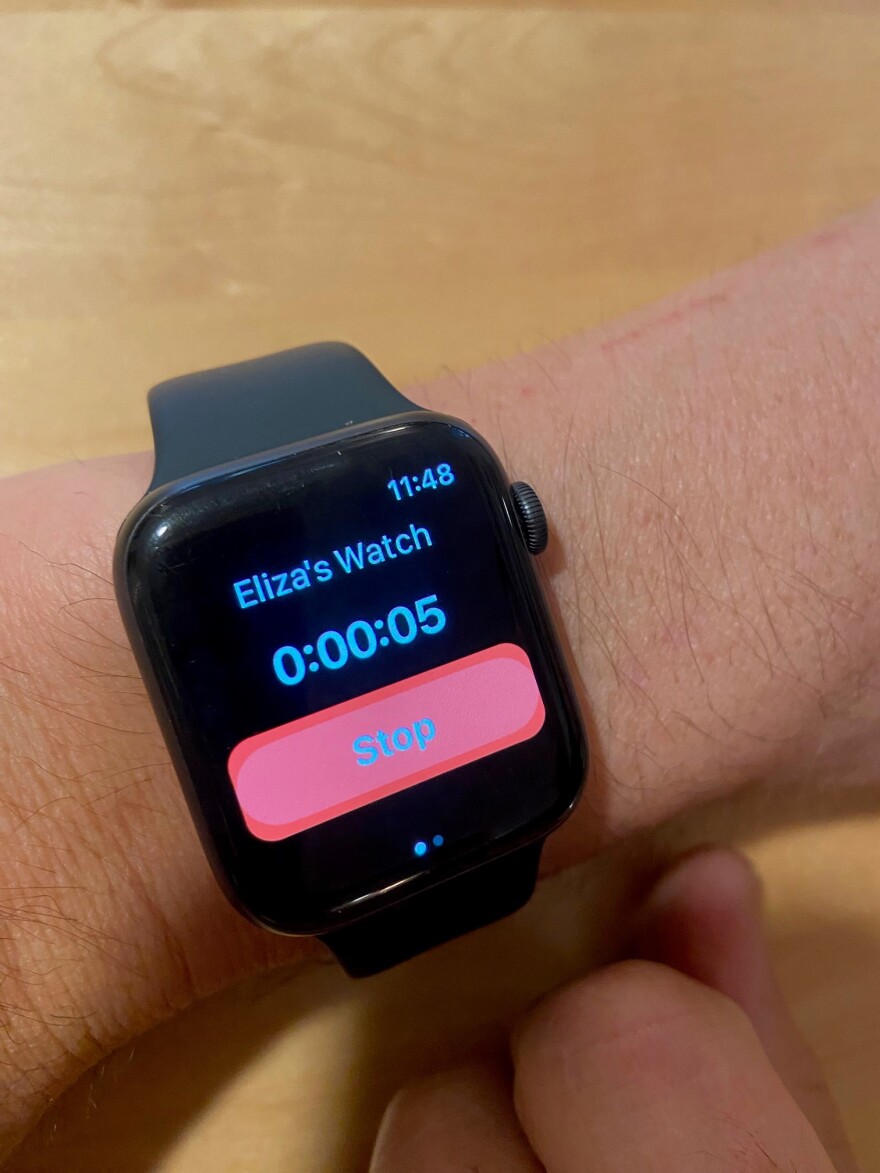As Massachusetts attorney general, Maura Healey earned a reputation for being tough on opioid manufacturers.
During her campaign for governor, Healey promised she would continue to address opioid addiction and overdoses. Statewide, the overdose rate fell slightly in 2022 but still kills around 2,000 people a year — and is up around 10% from 2020.
Now that Healey’s in the state’s top job, some stakeholders say they are still waiting to learn her plans for addressing the crisis.
Dan Harper, a UMass computer programmer, sees opioid addiction much differently today than he did even six years ago. In November 2018, his daughter Eliza died of an opioid overdose on her 26th birthday.
“She used alone in the family living room with my daughter upstairs. My my son was down the street in school,” he said recently at his South Deerfield home.
Because there was fentanyl in Eliza’s drugs, her breathing was repressed before anyone noticed.
“It's just a horrible, horrible thing,” Harper said. “And you basically just suffocate and die. You can't reach out. You can't call out for help.”
Had there been more people working on solutions — not just to addiction but to the deadly nature of the opiate supply — he believes his daughter may have been saved.
'I don't see it as an agenda point'
After a time of grieving, Harper became an advocate for other families.
In 2020, he was invited to be a part of then-Attorney General Maura Healey’s family advisory council. She had recently announced a massive settlement with opioid makers, including the Sackler family, and was soliciting ideas on how to use Massachusetts’ $90 million portion towards addiction services.
“I just remember sitting in this big board room just like trying to fade away into the corner, because I didn't really know how the whole thing worked,” Harper said. “And [Healey] just kind of called me out and said, ‘So, Dan, what do you think of all this?’”
Largely because of Healey’s work on opioids, Harper supported her run for governor. Her campaign highlighted that work as well.
One ad used a testimonial from another grieving father, Roger Brunelle Jr.
“Having somebody take on an organization that used our families as profit — as governor, I know she’ll be my champion,” Brunelle said.

Since Healey took office, though, Harper is concerned that opioid addiction has fallen off her priority list.
“I don't hear her talking about it,” he said. “I don't see it as kind of an agenda point.”
At the same time, he’s realistic about the myriad of issues on the governor’s plate.
“Reproductive rights, housing, transportation, you know, all these other things that are super important,” he said. “I don't want to fault her, because I think that her heart is in the right place. I just want this issue to cycle back."
Harper is among those who responded to a survey asking our listeners what the new governor’s priorities should be.
In a statement, a spokesperson for the Healey, Karissa Hand, said the administration "is focused on providing communities with the resources needed to support treatment, prevention and recovery efforts."
"We’re committed to addressing gaps in the system, advancing long-term solutions that include housing, jobs, and more resources for our cities and towns, expanding access to person-centered and culturally responsive care and behavioral health care, increasing investment in multidisciplinary crisis response teams, and ensuring families and allies receive real, actionable advice to help identify harm reduction services and available beds,” Hand said.
Continuing efforts begun under Gov. Baker
Some addiction specialists in western Massachusetts say they’re optimistic Healey will continue efforts that started under the previous administration.
“Gov. Baker really put forward a very robust kind of campaign and really put a lot of funding behind it,” said Robyn Ernst, who oversees mental health and addiction services at the Center for Human Development. “The pandemic unfortunately kind of slowed some of that progress. But I think what we're seeing with Maura Healey is that she really has a continued commitment to increasing funding.”
Healey’s proposed budget includes $184 million for the Bureau of Substance Addiction Services, which is down from last year but up from the previous 3 years.
Healey’s office says, overall, the budget would spend $600 million towards substance abuse prevention and treatment. That includes more access to rehab beds and addiction medication, as well as expanded distribution of the overdose reversing drug Naloxone.
Ernst said she expects Healey will continue to support the new community behavioral health centers program that began under the Baker administration. The centers are one-stop clinics meant to make it easier to avoid hospitals and get long-term care for mental health issues, including addiction.
Ernst says she also appreciated Healey’s talk about the mental health workforce during the campaign, since it’s become very difficult to attract and retain skilled staff in the addiction field. Ernst estimated entry-level salaries in the mid-$40,000s.
“We really want to see [the governor] continue to increase funding so we can make pay equitable,” Ernst said.
That could mean additional state grants for mental health and addiction services, or raising reimbursement rates that MassHealth and commercial insurers pay for addiction services, some of which happened in the Baker administration.
Ernst, who lost a family member to substance use disorder, also thinks Healey can use her position to help destigmatize addiction.
“Really coming out and — I really don't like to use the word normalizing, but being able to say, you know, this touches all of us,” she said. “It doesn't make it feel so shameful.”
Taylor McAndrew of the Northampton-based coalition Hampshire Hope said the Healey administration does appear to be focusing on harm reduction, including access to Naloxone, also known as Narcan.
“Sometimes, though, policy doesn't move at the speed of the opioid epidemic,” she said, “and a really tainted and poisonous drug supply has continued to grow at a quicker rate.”
McAndrew would like the state to help make testing strips more accessible so drug users can tell if their opiate supply includes fentanyl or the animal tranquilizer xylazine, which can be fatal in even small amounts.
Healey’s spokesperson, Karissa Hand, said the governor is working to make testing trips more available.
'She has the bully pulpit'
Another harm reduction measure is safe consumption sites, also called overdose prevention sites, where people can use illegal, and dangerous, drugs under observation.
“Other states have jumped ahead of us. I'm hoping this is the year that we decide that we're going to look at this as an option," said Dr. Peter Friedmann, an addiction researcher at Baystate Medical Center in Springfield.
Friedmann acknowledged that overdose prevention sites are a politically charged option, but he’d still like to see them in Massachusetts. While Healey’s office said she supports individual communities deciding whether to allow such sites, Friedmann said the governor hasn’t been vocal about that support.
“Some of it is about taking a stand on issues that are controversial federally, which are potentially life-saving,” he said. “I mean, she has the bully pulpit if she wants to make it happen.”
In a similar vein, Friedmann believes Massachusetts should take the lead in expanding the use of methadone to treat addiction. Currently the federal government strictly regulates the number and location of methadone clinics. He wants the state to allow primary care doctors to prescribe it.

“Did they wait for the feds to legalize cannabis? No,” Friedmann said. “And the state could say, ‘Well, we are going to do this and we will protect our practitioners within the state who choose to.’”
The governor’s office has worked with the federal government to expand access to methadone — allowing people to take doses at home, not just at a clinic, earlier in treatment and more frequently. But methadone still must be prescribed by a licensed opioid treatment program.
Developing 'Eliza's Watch'
Dan Harper is not waiting for the governor or Legislature to roll out new opioid initiatives.
Harper has designed his own method for overdose prevention. He’s developing a watch, called Eliza’s watch, that he believes might have saved his daughter. It’s programmed to ring quietly at first and then play loud recordings if someone stops breathing or moving. Some versions will call emergency services.
He’s currently trying to get investors for the project, and possibly state funding.
Harper once met Baker at a meeting and showed him his watch proposal. He’s hoping he gets the chance to do that with Healey one day as well.
In the meantime, he’s joined a family advisory council convened by Healey’s successor in the attorney general's office, Andrea Campbell.
This story is part of a series of NEPM reports inspired by questions our listeners wanted us to ask the new governor. Let us know what you think Healey should focus on during her first months in office.




